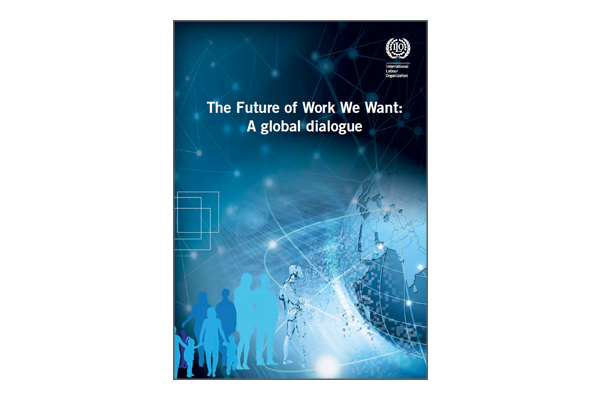El futuro del trabajo que queremos: Un diálogo global (OIT, 2017)

Traducir:
Foreword
This report presents a short summary of the International Labour Organization’s (ILO’s) Global Dialogue on “The Future of Work We Want”, which brought together leading economists, academics and representatives from governments and social partners (employers’ and workers’ organizations) to discuss the profound changes sweeping through the world of work. More than 700 people participated in the two-day event, which took place at the International Labour Office in Geneva on 6–7 April 2017. In addition, more than 2,000 people throughout the world followed the event and contributed via live video streaming and social media.
The Global Dialogue was part of the broader ILO Centenary Initiative to explore and examine the future of work in order to gain a better understanding of the drivers of the current unprecedented change, such as technological innovation, the changes in the organization of work and production, globalization, climate change, regulatory environment, demographic and migration shifts.
As part of the ILO Centenary Initiative, this two-day event marked an important step in deepening our understanding of the changes we are facing as well as highlighting the need to develop effective policy responses that can help shape the future of work to achieve the best possible outcome for our society. The event was structured around the Initiative’s four “centenary conversations”, namely work and society, decent jobs for all, the organization of work and production and the governance of work. A special session also discussed the perspectives and views of young people. By bringing together such a diverse group of people, almost all of whom are from outside the ILO, we heard thoughts and viewpoints that both challenge and complement our own ideas about the future of work.
This landmark event on the future of work concluded with a call on the global community to make social dialogue between governments and the social partners a key instrument for building a world of work in which no one is left behind. The need to transform our thinking into concrete outcomes and actions was also strongly emphasized, particularly in terms of addressing the urgent concerns of young people.
I would like to thank the Research Department for coordinating the event and for preparing this report. The event also benefited greatly from the strong collaboration of the ILO Policy Portfolio, the Director-General’s Special Adviser on the Future of Work and the Future of Work Unit, the Department of Communication and the Official Meetings, Documentation and Relations Department.
Deborah Greenfield, ILO Deputy Director-General for Policy

